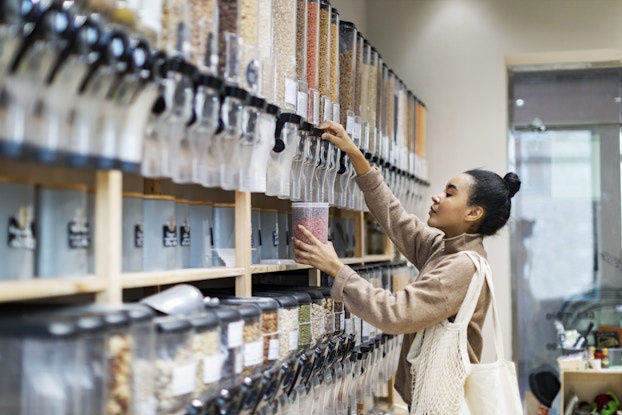
As more companies begin incorporating sustainability into their business strategy, they start using more environmental terms in their marketing. Let’s look at nine sustainable business terms and what they mean.
[Read more: How to Make Your Business More Sustainable]
1. B corp
A B corp is a for-profit company whose business model is designed to create a positive social or environmental impact. B corps must publish public reports on their social and environmental impact.
A B corp creates greater trust with its customers and the public and can attract employees and investors aligned with its mission. To become certified, you must undergo a risk assessment and verify your status every three years. However, the process varies slightly depending on your company size.
[Read more: Starting a B Corporation? Here's What to Know]
2. Biodegradable
If something is biodegradable, it can be naturally broken down into smaller components, such as sugars and gases. However, this can get confusing because the term doesn’t reference any particular time frame.
For instance, some materials are easily biodegradable, while some could take hundreds of years to decompose. For a company to claim a product is biodegradable, it must “break down completely and return to nature” within one year.
3. Corporate social responsibility (CSR)
Corporate social responsibility (CSR) is a strategy companies use to ensure their operations benefit society. It’s a broad concept that is implemented in a number of different ways.
Businesses that engage in CSR initiatives usually focus on the following four categories:
- Environmental responsibility.
- Human rights responsibility.
- Philanthropic responsibility.
- Economic responsibility.
4. Eco-friendly
If a product is eco-friendly, it’s either friendly to the environment or, at the very least, isn’t harmful. The term usually refers to products that help conserve resources or prevent pollution.
Here are some examples of eco-friendly products:
- It contains sustainably raised ingredients.
- It was produced in a way that doesn’t harm the ecosystem.
- It contains organic ingredients.
- It was produced using recycled ingredients.
- It is biodegradable.
[Read more: 10 Eco-Friendly Packaging Options for E-Commerce Businesses]
For a company to claim a product is biodegradable, it must “break down completely and return to nature” within one year.
5. Green
A green product is durable, non-toxic, minimally packaged, and has less environmental impact than comparable products. However, there’s still a lot of controversy around what makes a product “green,” and the boundaries are poorly defined. This has led to an increase in deceptive marketing practices like greenwashing.
6. Greenwashing
Greenwashing is when a company provides misleading information about how environmentally friendly its products are. Businesses often make exaggerated claims about the environmental impact and fail to back up those assertions with data. Greenwashing is harmful because it tricks consumers and can hurt a brand’s reputation.
7. Non-toxic
Personal care and cleaning products are often labeled as “non-toxic,” but what does that mean? According to the Consumer Product Safety Commission (CPSC), something is toxic if it “can produce personal injury or illness to humans when it is inhaled, swallowed, or absorbed through the skin.”
A product is considered toxic if it causes death in more than 50% of its animal subjects within 14 days. Beyond that, the term “non-toxic” is pretty unregulated, and it’s up to consumers to inform themselves about the ingredients contained in products.
8. Organic
In the U.S., the USDA National Organic Program is responsible for regulating organic products. USDA-certified organic foods are grown and processed according to federal guidelines.
There are specific guidelines that must be followed concerning the soil quality, weed and pest control used, and use of additives. And labeling guidelines are set based on the percentage of organic content — products labeled “organic” must have at least 95% organically produced ingredients, aside from water and salt.
9. Sustainability
Sustainability refers to a system’s ability to be maintained at a certain level. For instance, a sustainable business can maintain its operations without having a negative impact on the environment or society. A sustainable business is profitable while still attempting to solve social and environmental problems.
CO— aims to bring you inspiration from leading respected experts. However, before making any business decision, you should consult a professional who can advise you based on your individual situation.
Follow us on Instagram for more expert tips & business owners’ stories.
CO—is committed to helping you start, run and grow your small business. Learn more about the benefits of small business membership in the U.S. Chamber of Commerce, here.
Join us for our Small Business Day event!
Join us at our next event on Wednesday, May 1, at 12:00 p.m., where we’ll be kicking off Small Business Month alongside business experts and entrepreneurs. Register to attend in person at our Washington, D.C., headquarters, or join us virtually!








